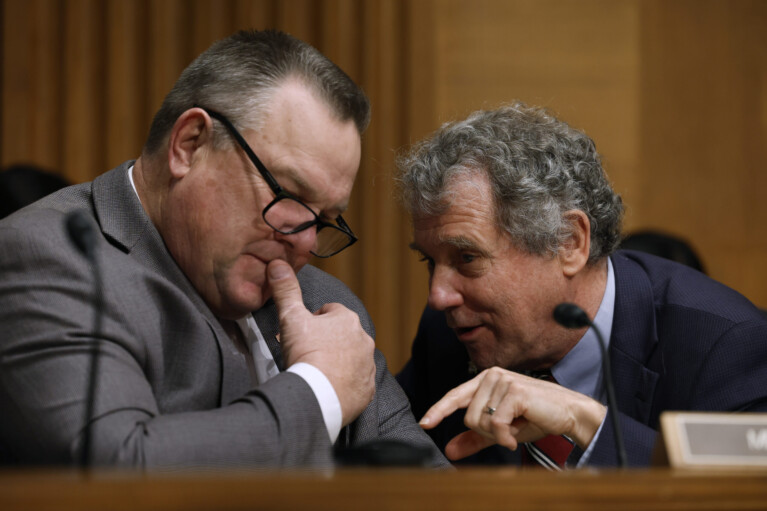AG Joins Call for Hogan to Extend Moratorium on Evictions

Attorney General Brian E. Frosh (D) wants Gov. Lawrence J. Hogan (R) to extend the state’s moratorium on evictions until next January, giving lawmakers more time to deal with what advocates have called a “tsunami of evictions.”
Frosh urged Hogan in a Tuesday letter to remove the moratorium’s requirement that tenants prove that their financial hardship was caused by COVID-19 if they want to avoid eviction.
“We also believe that your eviction order must not require tenants to prove COVID-19 hardship, but rather must simply suspend all eviction actions, with narrow emergency-related exceptions, in order to provide meaningful protection for Marylanders,” Frosh wrote.
Hogan should also look at expanding the state’s rental relief and eviction prevention funding, Frosh said in the letter. He called the $30 million that Hogan already allocated to help renters “woefully inadequate,” and urged the governor to look for more resources for rental assistance.
Advocates at CASA, an immigrants’ rights group, have repeatedly called on Hogan to allocate more than $150 million toward rental relief. With local jurisdictions’ rental relief programs already overwhelmed with applications, they say the state’s $30 million will do little to help the estimated 292,000 Marylanders at risk of eviction.
“Mass homelessness would not only occasion deep suffering by the dislocated, but would also spread COVID-19 infections and death and prolong the crisis for everyone,” Frosh wrote.
The attorney general’s letter to Hogan came a day after a group of Maryland senators released sweeping recommendations on averting a housing crisis in the state. In their recommendations, the members of a bipartisan Senate Judicial Proceedings Committee workgroup urged Hogan to maintain his moratorium.
The senators in the workgroup also asked state officials to look at setting up a legal assistance program for renters and small landlords. Frosh urged Hogan to look at expanding legal aid funding for renters facing eviction, noting that defendants rarely appear in rental court cases even under normal circumstances.
“It is unrealistic to expect that tenants who are currently unemployed or behind in their rent and other expenses, or unable to find childcare, will appreciate the implications and be able to respond to a summons for rent or debts they do not believe they would be able to pay anyway,” Frosh wrote.
In a separate letter last Friday, Frosh asked the Maryland judiciary to extend its stay on eviction proceedings. The state’s District Court previously indicated that it will begin processing warrants of restitution for failure to repay rent cases after July 25, the same day a federal moratorium on evictions expired, but won’t be hearing failure to pay rent cases until Aug. 31.
Frosh hopes extending the moratorium on evictions until January will give the General Assembly time to come up with a solution to alleviate a potential housing crisis.
“A few months reprieve would help the State avoid thousands of evictions and loss of services, harm to public health, and preventable suffering,” he wrote. “It would give Marylanders much-needed time to continue working together to begin to overcome the extraordinary health and economic challenges of this pandemic.”
While tenants won’t be facing failure to pay rent cases until the end of August, they’ll likely face a different type of court action in the meantime.
State courts will soon see an increase in “tenant holding over” cases, Matt Hill, an attorney with the Public Justice Center, a non-profit legal aid center that advocates for and represents low-income clients in civil cases, said.
Tenant holding over filings happen when a tenant stays on a property after the end of their lease. Landlords can file a notice of non-renewal to tenants before their lease ends, and generally have to do so between 30 and 60 days before the end of a lease.
Many of Hill’s clients have month-to-month leases, and some have already received 60-day notices to vacate their homes. He said notices to vacate and tenant holding over filings were relatively rare before the pandemic, but have been skyrocketing in recent weeks.
“I’ve been doing this for 10 years, and you don’t see too many non-renewals or notices to terminate tenancies,” Hill said. “Yet all of our clients who are allegedly behind for one reason or another are getting these notices to vacate.”
After a tenant receives a 30- or 60-day notice to vacate their leased property, Hill said a landlord can file a tenant holding over complaint the day after the notice expires. After that, the tenant will be issued a summons and a copy of the complaint.
The time from the complaint being issued and a trial varied greatly by jurisdiction even before the coronavirus pandemic, Hill said, but would generally take between two and three weeks in Baltimore City. He added that the time from the complaint being issued to the trial will likely be longer as courts are overwhelmed with filings in the coming months.
Hill warned that tenant holding over cases represent a “huge loophole” in Hogan’s executive order. Frosh noted in his letter to Hogan that, if the governor’s executive order isn’t expanded, courts will begin hearing tenant holding over and breach of lease actions.
“The current Executive Order … provides the COVID-19 hardship defense only for failure to pay rent and breach of lease actions,” Frosh’s letter reads. “This limitation bars any eviction protection in tenant holding over cases, the basis of which is often a tenant’s failure to pay rent.”
Hill noted that many tenants won’t be able to provide documentation to prove their financial hardship was caused by COVID-19, or will simply opt to lose their homes to avoid having an eviction filing on their record.
“We’re talking about folks who are living in kind of an informal economy,” Hill said. “This idea that we’re gonna have all this documentation of this substantial loss of income for many of our most vulnerable residents is just not feasible.”




 Creative Commons Attribution
Creative Commons Attribution